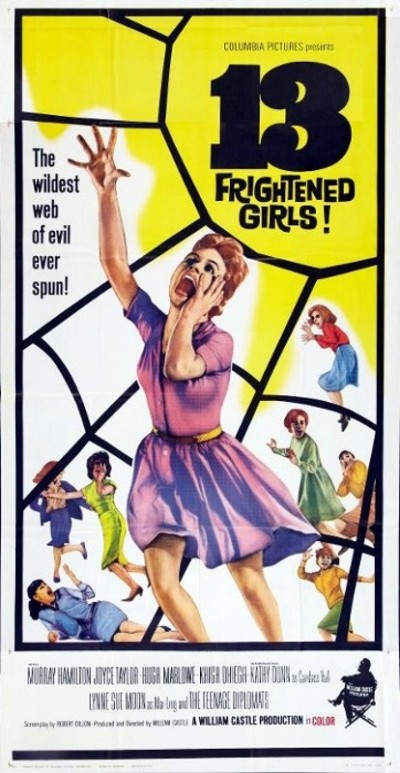★★★
“A video-game, trying to get out.”
 The daughter of the American ambassador is kidnapped, and is being held on an island off the Indonesian coast. Conventional attempts to stage a rescue mission end badly, and pressure from the US mounts on the government to do something. Colonel John (Thomas) is in charge, and comes up with a daring plan. Well, to be honest, the word “ludicrous” might be more appropriate, or perhaps that’s just me. He recruits ten models with a range of martial arts talents – silat, wushu, archery, etc. – and in five days, his tough-as-nails second in command, Major Cathy (Anderson) will lick them into a cohesive unit, which can infiltrate the island and mount a daring rescue. “Why do they have to be models?”, I hear you asking. Again, to be honest, this is never exactly explained. Still, for cinematic purposes, we’ll let it slide, since the intent is clear: it lets them kick ass, while looking good doing so.
The daughter of the American ambassador is kidnapped, and is being held on an island off the Indonesian coast. Conventional attempts to stage a rescue mission end badly, and pressure from the US mounts on the government to do something. Colonel John (Thomas) is in charge, and comes up with a daring plan. Well, to be honest, the word “ludicrous” might be more appropriate, or perhaps that’s just me. He recruits ten models with a range of martial arts talents – silat, wushu, archery, etc. – and in five days, his tough-as-nails second in command, Major Cathy (Anderson) will lick them into a cohesive unit, which can infiltrate the island and mount a daring rescue. “Why do they have to be models?”, I hear you asking. Again, to be honest, this is never exactly explained. Still, for cinematic purposes, we’ll let it slide, since the intent is clear: it lets them kick ass, while looking good doing so.
Any other questions? No? It’s for the best, trust me.
You should probably think of this as an Indonesian equivalent to DOA: Dead or Alive: cheesecake flavoured action, not to be taken seriously in the slightest. There are basically two section to this. The first is the group’s “boot camp,” which mostly consists of Major Cathy putting them through physical and psychological torment. There is a lot of yelling; I don’t know about you, but she certainly put the fear of God into me. Yet it’s also quite impressive, to have someone on the side of the heroines, who clearly doesn’t give a damn about being nice. There’s something almost admirable about her focus on the #SquadGoals, to the exclusion of everything else. Just don’t expect anything in the slightest as far as characterization of the “10” goes. For the vast majority, you’ll get a caption describing their skills, and that’s it.
The second half is almost one extended action sequence, depicting their rescue mission. It does slow down in the middle for a bit, after some of the team get captured. However, it then kicks back into gear for the final 15 minutes, and probably wisely, it saves the best for last. There’s a barn-storming battle, in an increasingly-flooded warehouse, pitting the best of the government forces against the best of the terrorist. The latter include their leader – technically called Paul, but whom should really be called Mr. Shouty, for his habit of YELLING EVERY LINE HE HAS TO DELIVER – and his sidekick, the tall, blonde Jane (Zavialova), whose skills are quite impressive.
As the tag-line at the top suggests, this feels more like an adaptation of a console beat-em-up. In it, you would be able to select one of the ten trainees, taking them through a series of missions under Major Cathy, which let you earn skill points which can be applied to your abilities. You then get to use these as you land on the island, battle your way across, and finally, defeat Jane and Paul to rescue the ambassador’s daughter. I can feel my thumbs twitching. But as a movie? It’s a rather imperfect 10.
Dir: Helfi C.H. Kardit
Star: Karenina Maria Anderson, Jeremy Thomas, Roy Marten, Svitlana Zavialova





 Director Roberts returns for a sequel to
Director Roberts returns for a sequel to  Difficult though it is to believe, a film containing the remarkable line of dialogue above still manages, largely, to be dull and uninteresting. Charlie’s Angels has a lot to answer for, spawning a slew of knock-offs and imitators as a result of its success, all over the world. In this case, the origin is Indonesia, where scientist Hardy has just discovered a new kind of super-explosive. He’s worried about it falling into the wrong hands, and rightfully so, as he and girlfriend Yanti (Octavia) are kidnapped by the evil Mr. Brutho. Yanti is able to escape, although Brutho – who goes through minions like the rest of us go through socks – plans to kidnap her mother and little sister. The aim is to use them as leverage (which is where we get the tag-line) and force Hardy to make his new explosive, for sale to a Middle Eastern potentate.
Difficult though it is to believe, a film containing the remarkable line of dialogue above still manages, largely, to be dull and uninteresting. Charlie’s Angels has a lot to answer for, spawning a slew of knock-offs and imitators as a result of its success, all over the world. In this case, the origin is Indonesia, where scientist Hardy has just discovered a new kind of super-explosive. He’s worried about it falling into the wrong hands, and rightfully so, as he and girlfriend Yanti (Octavia) are kidnapped by the evil Mr. Brutho. Yanti is able to escape, although Brutho – who goes through minions like the rest of us go through socks – plans to kidnap her mother and little sister. The aim is to use them as leverage (which is where we get the tag-line) and force Hardy to make his new explosive, for sale to a Middle Eastern potentate. There aren’t many films which will be reviewed both here and on aquaticsintl.com, a site offering “Commercial swimming pool and waterpark industry news” [their opinion: a “woefully inaccurate portrayal of pool technology”]. But then, if you see only one film about sisters trapped underneath a swimming-pool cover this year… Yeah, it’s highly likely to be this one. Eskandari deserves some credit for taking a paper-thin and highly dubious premise and almost stretching it out to feature length. But even he eventually runs out of steam at about the hour mark, and derisive snorting will take over from there.
There aren’t many films which will be reviewed both here and on aquaticsintl.com, a site offering “Commercial swimming pool and waterpark industry news” [their opinion: a “woefully inaccurate portrayal of pool technology”]. But then, if you see only one film about sisters trapped underneath a swimming-pool cover this year… Yeah, it’s highly likely to be this one. Eskandari deserves some credit for taking a paper-thin and highly dubious premise and almost stretching it out to feature length. But even he eventually runs out of steam at about the hour mark, and derisive snorting will take over from there.  Rarely, if ever, have I seen a film so thoroughly derailed by one bad decision. There’s potential here, and those involved have some decent track records as well. Director Lyde did the last two installments of the Mythica saga, including the best one,
Rarely, if ever, have I seen a film so thoroughly derailed by one bad decision. There’s potential here, and those involved have some decent track records as well. Director Lyde did the last two installments of the Mythica saga, including the best one,  It wasn’t until the end, when the credits ran and I saw someone’s name I knew, that I realized this was actually a local production, shot here in Phoenix. Maybe I should have been paying more attention, or maybe that just speaks to the bland lack of place present in this low-budget Crow knock-off. For, despite the poster which is obviously riffing off another comic-book movie, this one is clearly inspired by Alex Proyas’s cult classic. I am, however, pleased to report that the lead star here did actually make it through the entirety of production with a pulse, so they come out ahead of their inspiration in that department.
It wasn’t until the end, when the credits ran and I saw someone’s name I knew, that I realized this was actually a local production, shot here in Phoenix. Maybe I should have been paying more attention, or maybe that just speaks to the bland lack of place present in this low-budget Crow knock-off. For, despite the poster which is obviously riffing off another comic-book movie, this one is clearly inspired by Alex Proyas’s cult classic. I am, however, pleased to report that the lead star here did actually make it through the entirety of production with a pulse, so they come out ahead of their inspiration in that department. Stealing from both Open Water and
Stealing from both Open Water and  In February 2002, Ingrid Betancourt was travelling through a rural area of Colombia, as part of her campaign in the presidential election for the Green Party. She was stopped at a road-block run by the Marxist rebel organization, FARC, and when they realized who they had, she and her assistant, Clara Rojas, were kidnapped. Betancourt would spent more than six years of jungle captivity with the guerillas, until she was rescued, in a startling piece of deception, by Colombian military forces. This documentary film tells her story, through archive footage and interviews with Betancourt, Rojas, other kidnappees and some of the FARC members.
In February 2002, Ingrid Betancourt was travelling through a rural area of Colombia, as part of her campaign in the presidential election for the Green Party. She was stopped at a road-block run by the Marxist rebel organization, FARC, and when they realized who they had, she and her assistant, Clara Rojas, were kidnapped. Betancourt would spent more than six years of jungle captivity with the guerillas, until she was rescued, in a startling piece of deception, by Colombian military forces. This documentary film tells her story, through archive footage and interviews with Betancourt, Rojas, other kidnappees and some of the FARC members.
